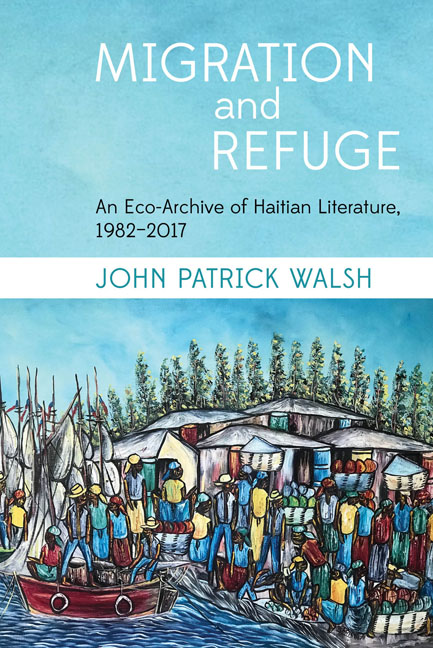Book contents
- Frontmatter
- Contents
- Acknowledgments
- Introduction: Tè glise, Continents à la dérive: Haiti between Shifting Continents, Past and Present
- Part I The Eco-Archive
- Part II Literary Witnesses
- Part III The Anthropocene from Below
- Epilogue Land and Seas of Migration and Refuge, Past and Present
- Bibliography
- Index
2 - Haitian Odysseys
- Frontmatter
- Contents
- Acknowledgments
- Introduction: Tè glise, Continents à la dérive: Haiti between Shifting Continents, Past and Present
- Part I The Eco-Archive
- Part II Literary Witnesses
- Part III The Anthropocene from Below
- Epilogue Land and Seas of Migration and Refuge, Past and Present
- Bibliography
- Index
Summary
Il existe des alternatives aux mots de l’exode: à boat-people, quand les bateaux se raréfient sans que le flux des fuyards s’arrête pour autant; à immigré (qui prend acte d’un état) ou à immigrant (qui met l’accent sur un processus de passage univoque et définitif d’un lieu à l’autre), quand le phénomène est plutôt celui d’une migration quasiment intransitive, d’un mouvement de départ dans le déchirement et d’arrivée toujours différée.
Jean-Claude Charles, De si jolies petites plages, 192Le peuple des terres mêlées closes with a glimpse of a possible future. Did Pedro and Adèle survive along with the other refugees, and if so, what might have become of them? At the novel's end, life resumes for the people of the frontier, as daily rituals are repeated to give meaning to “tous les coins de la frontière haïtienne” (146). The refugees “ … ont reçu les saints, les anges avec les mêmes offrandes, chanté les mêmes refrains avec les mêmes instruments de musique, dansé les mêmes rythmes, fait la même cuisine … Ils sont venus coupler leur vie, d’ici à l’autre bord, avec le rêve de créer le peuple des terres mêlées” (147). Despite Trujillo's violence, they continue to negotiate the border as a space of solidarity for a future in common. Compared to the bleak setting that Danticat would witness some sixty years later, Philoctète’s fictional utopia appears as a distant mirage. It is tempting to consider the hopeful portrayal of the aftermath of imperial occupation and dictatorial violence in the 1930s in the context of Philoctète's life story and the historical juncture in which he published the novel. Le people des terres mêlées captures an aura of turmoil, fear, and violence that might also be read as a reflection of the post-Duvalier period.
The present chapter now turns its attention to the writings of Emile Ollivier and Jean-Claude Charles. Much has been written about the theme of exile in Ollivier's oeuvre. Likewise, critics have written about the “enracinerrance” peculiar to Charles's life and writings. First coined in Le corps noir (1980), enracinerrance escapes neat definition. Eliana Vagalau reads it in terms of Deleuze's rhizome and Glissant's Relation as a “state of permanent exile, in which roots are not to be found solely in place or culture of origin, but form along the path of one's journey” (“Jean-Claude Charles: Challenging the Notion of Global Literature,” 241).
- Type
- Chapter
- Information
- Migration and RefugeAn Eco-Archive of Haitian Literature, 1982–2017, pp. 69 - 102Publisher: Liverpool University PressPrint publication year: 2019

